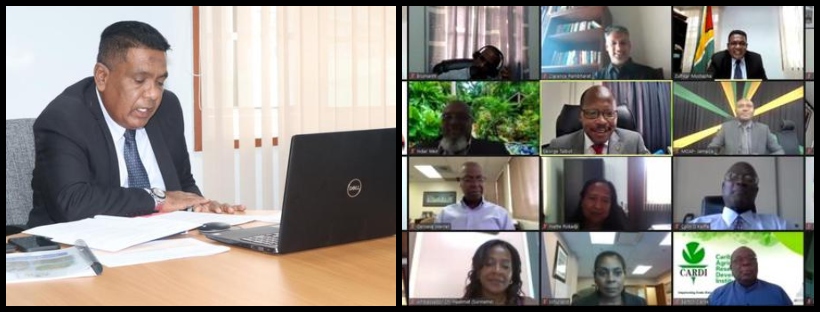With Guyana once again taking the lead on agriculture in CARICOM, a Special Ministerial Task Force on Food Production and Food Security has been established to advance CARICOM’s agri-food systems agenda.
The Food Production and Food Security Agenda was put forward by President Dr. Irfaan Ali during the 32nd CARICOM Heads of Government Meeting last February. CARICOM subsequently endorsed the agenda and agreed to the establishment of the task force to implement the strategy.
Earlier today, Agriculture Minister Zulfikar Mustapha, who also serves as Chairman of the Special Ministerial Task Force, hosted the inaugural meeting with Ministers of Agriculture from the ten participating CARICOM member states.
During his address, Minister Mustapha said that the objective of the task force is to guide the regional position towards the transformation of the agri-food system allowing for a significantly more resilient, wealth-generating, and food secure Region.
“Food system transformation is at the core of our aspirations and mandate. Therefore, our activities over the next years would be geared towards this goal. Specifically, the CARICOM Agri-Food System Strategy seeks to frontally address the complete removal of all technical barriers to trade, development of a CARICOM Cross Border Agri-Food Investment Strategy to support production corridors, accelerating the pace of finalizing and adopting of the CARICOM Investment Code, completion of the reform of the CET suspension and rule of origin regimes to afford protection to regional enterprises and to support the competitiveness of regional forms, implementation of E-Agriculture Strategy, development of measures to promote de-risking of the sector, improvement of transport and logistics and, investment in production, research and development,” Minister Mustapha said.
Minister Mustapha added that “to achieve this, an Implementation Plan with 36 broad policy areas has been articulated and selected priority sectors such as poultry, corn/soya bean, rice, beef pork, mutton, coconut, niche vegetables, fruits, and fruit juices, ginger turmeric have been identified for us to advance commercialization agenda of the regional food system.”
The Ministerial Task Force comprises Agriculture Ministers and other officials from Antigua and Barbuda, Barbados, Belize, Bahamas, Dominica, Jamaica, St. Vincent, and the Grenadines, Suriname, and Trinidad and Tobago.
During the meeting, the Task Force also reviewed, amended, and accepted the Terms of Reference (TOR), which was developed by a team of technical officers from the CARICOM Secretariat. The TOR outlines the objectives, purpose, membership, and governance of the task force.
During his presentation, Programme Manager, Agricultural and Agro-Industrial Development, CARICOM, Shaun Baugh discussed the implementation plan for the strategy. He said that the objective of the plan was to commercialization of the Regional agri-food industry, with actual commencement of private-sector production activities in priority sectors identified, within a three-year window. He also discussed several broad policy measures and reforms required to support the commercialization of the Region’s Agri-food System.
In the short term and medium term, trade barriers were identified as a major constraint that will be addressed. The need for the development of an e-agriculture strategy as well as investments in production, research and development were classified as long-term areas that need to be addressed.
The Task Force will also work to engage the Regional Private Sector, foreign investors, international and regional institutional partners, and the Diplomatic Community to formulate effective partnerships to take the work forward.
At the end of the meeting, Minister Mustapha tasked the Heads of Government to discuss the TOR and implementation plan with their fellow Cabinet members ahead of the next Ministerial Task Force meeting which is scheduled to take place once monthly ahead of the next CARICOM Heads of Government Conference.
Guyana has once again taken the lead role in agriculture in CARICOM after surrendering the position to St. Vincent and the Grenadines under the previous administration.













